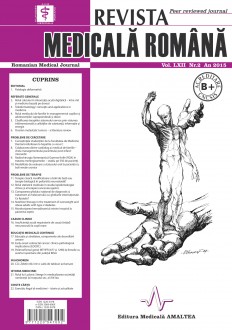SELECT ISSUE

Indexed

| |

|
|
|
| |
|
|
|

|
|
|
|
|
|
|
HIGHLIGHTS
National Awards “Science and Research”
NEW! RMJ has announced the annually National Award for "Science and Research" for the best scientific articles published throughout the year in the official journal.
Read the Recommendations for the Conduct, Reporting, Editing, and Publication of Scholarly work in Medical Journals.
The published medical research literature is a global public good. Medical journal editors have a social responsibility to promote global health by publishing, whenever possible, research that furthers health worldwide.
EARLY-ONSET COLORECTAL CANCER: CLINICO-PATHOLOGICAL IMPLICATIONS (EOCRC)
Meda Laura Comandasu, Emel Suliman, Octavia Rusu, C. ŞAVLOVSCHI and S. Oprescu
ABSTRACT
Objective. The purpose of this study is to analyse histopathological and clinical characteristics of EOCRC. Colorectal cancer was formerly considered as a disease of senescent age; in the last years, it is a noticeable trend of growing incidence among young people (aged between 20 and 45 years). Few of newly diagnosed cases are inherited and most of them are sporadic.
Material and method. The authors studied retrospectively a series of 33 cases of early onset colorectal cancer, 17 men and 16 women, with ages below 45 years, admitted between January 2009 and January 2015 in II and IV Surgical Wards of Emergency University Hospital Bucharest.
Results. Colorectal cancer in young adults tends to be an aggressive disease with dominant distal location (68.5% of all cases), mostly adenocarcinomas (96.6%) with moderate to poorly differentiated types (51.4% G2 and G3), diagnosed in advanced stages (57.6% stages III and IV), with high frequency of complications (33% presented with peritoneal carcinomatosis and 9% died during hospitalization).
Conclusions. EOCRC is a heterogenous group regarding etiopathogeny, localization and histopathological features of the tumor, with aggresive histopathological types, diagnosed in advanced stages. It may be necessary to elaborate new screening protocols for colorectal cancer in young adults and to find clinical and biological markers that are indicating high-risk patients.
Keywords: early onset colorectal cancer, colonoscopy, family X-type syndrome, sporadic type colorectal cancer
